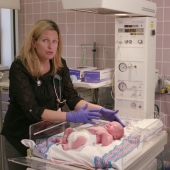Pregnancy in most cases, is associated with remission of rheumatoid arthritis (RA), but a quarter of patients continue to have active disease or even worsening of the disease and most patients who improve, relapse in the postpartum period.
The pathophysiology of this improvement in disease activity during pregnancy remains unknown, but hormonal, cell-mediated immunological and humoral immunological changes during pregnancy, have been proposed responsible for this.
Most of the pregnant women with RA have an uneventful course, with no significant complications. In general, no significant increase in maternal or fetal morbidity seems to be attributable to RA. Patients with RA do not have decreased fertility.
A majority of patients with RA may go in remission and anti-rheumatic treatment may not be required as soon as women become pregnant. But other patients who continue with the disease activity require treatment.
The preferred disease-modifying agents during pregnancy are sulfasalazine and hydroxychloroquine. Azathioprine and cyclosporine can be used if the benefits outweigh the risks.
Paracetamol and low dose prednisone are preferred and considered safe, both for mother and fetus. Methotrexate and lefunomide are contraindicated and must be prophylactically withdrawn before a planned pregnancy.
Biologics generally should be stopped when pregnancy is discovered. An overall rational approach is highly warranted to treat RA during pregnancy.
- 5 views













